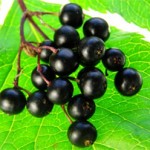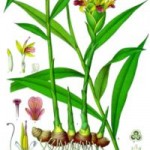We are most definitely in cold and flu season, even here in usually sunny southern California. Nobody really wants either, but most of us are not particularly good at avoiding them. They are viral infections; antibiotics won’t work, although doctors have been known to prescribe them anyway, just to satisfy their patients. Both are infections of the respiratory system – the “stomach flu” is not influenza. So how do you tell them apart? According to the Centers for Disease Control,
the flu is worse than the common cold, and symptoms such as fever, body aches, extreme tiredness, and dry cough are more common and intense. Colds are usually milder than the flu. People with colds are more likely to have a runny or stuffy nose. Colds generally do not result in serious health problems, such as pneumonia, bacterial infections, or hospitalizations.
 My go-to herb for prevention is generally elderberry, and usually in lozenge or tea form. Any time you hold something you are consuming in your mouth before swallowing, you make your body more receptive (or antagonistic, if it’s poison) and you can process it better. In other words, you get more out of it. Elderberry is an antiviral. Once you have an infection, it’s still helpful, because it reduces phlegm, is an anti-inflammatory, and (since it’s antiviral) the infection won’t last as long. I happen to be rather partial to the Sambucus brand, but feel free to find on that works for you, or just make some tea. For prevention, I take one in the morning and one at night. This particular tactic has worked for many a kindergarten teacher, by the way. Once I feel an infection coming on, I take one every three hours (when I’m awake) or so until all of my symptoms have passed.
My go-to herb for prevention is generally elderberry, and usually in lozenge or tea form. Any time you hold something you are consuming in your mouth before swallowing, you make your body more receptive (or antagonistic, if it’s poison) and you can process it better. In other words, you get more out of it. Elderberry is an antiviral. Once you have an infection, it’s still helpful, because it reduces phlegm, is an anti-inflammatory, and (since it’s antiviral) the infection won’t last as long. I happen to be rather partial to the Sambucus brand, but feel free to find on that works for you, or just make some tea. For prevention, I take one in the morning and one at night. This particular tactic has worked for many a kindergarten teacher, by the way. Once I feel an infection coming on, I take one every three hours (when I’m awake) or so until all of my symptoms have passed.
 Garlic, ginger and honey are magnificent this time of year as well. Garlic and ginger are both warming, help with phlegm, and affect digestive issues as well as respiratory ones. Honey is an anti-bacterial, soothes sore throats in tea, and will help ward off anything that isn’t covered by the antiviral properties of the elderberry. Fresh, local sources on all of these are preferred, especially the honey. I have been seeing more and more instances of adulterated and mislabeled honey, so get yours from a local beekeeper if you can. My favorite treatment method with ginger and garlic is to make homemade soup with lots of both of them in the stock. Millions of grandmothers can’t be wrong. Honey is most easily ingested in tea, and peppermint is a great tea for soothing respiratory and stomach ailments.
Garlic, ginger and honey are magnificent this time of year as well. Garlic and ginger are both warming, help with phlegm, and affect digestive issues as well as respiratory ones. Honey is an anti-bacterial, soothes sore throats in tea, and will help ward off anything that isn’t covered by the antiviral properties of the elderberry. Fresh, local sources on all of these are preferred, especially the honey. I have been seeing more and more instances of adulterated and mislabeled honey, so get yours from a local beekeeper if you can. My favorite treatment method with ginger and garlic is to make homemade soup with lots of both of them in the stock. Millions of grandmothers can’t be wrong. Honey is most easily ingested in tea, and peppermint is a great tea for soothing respiratory and stomach ailments.
All of these are reasonably safe in pregnancy, although you should always check with your obstetrician and make sure there is no elder bark in your elderberry, as that’s not as safe.